Exploring Ethics in Accounting: An Annotated Bibliography Review
VerifiedAdded on 2023/06/15
|6
|1225
|473
Annotated Bibliography
AI Summary
This annotated bibliography explores the critical role of ethics in the accounting profession through a review of five key articles. The articles address various aspects of ethical considerations, from the causes of unethical behavior in accounting firms and the importance of ethical leadership to the ethical implications of multinational tax avoidance and the relevance of ethical codes in professional practice. The bibliography highlights the need for accountants to prioritize public trust and adhere to ethical guidelines to ensure the integrity of financial reporting and corporate governance. It emphasizes the potential risks associated with ethical violations and the importance of incorporating ethics into organizational culture. Desklib provides access to this and many other solved assignments for students.
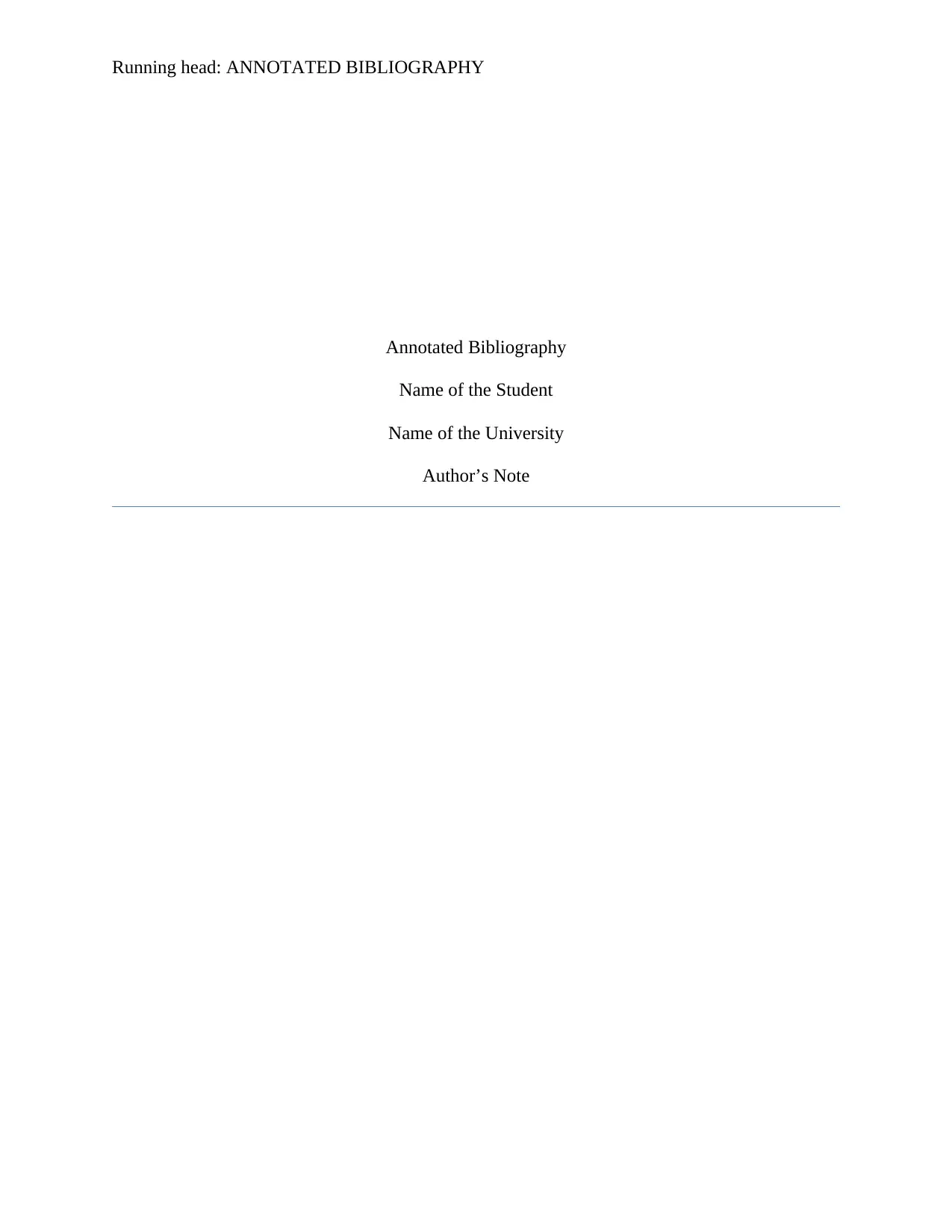
Running head: ANNOTATED BIBLIOGRAPHY
Annotated Bibliography
Name of the Student
Name of the University
Author’s Note
Annotated Bibliography
Name of the Student
Name of the University
Author’s Note
Paraphrase This Document
Need a fresh take? Get an instant paraphrase of this document with our AI Paraphraser
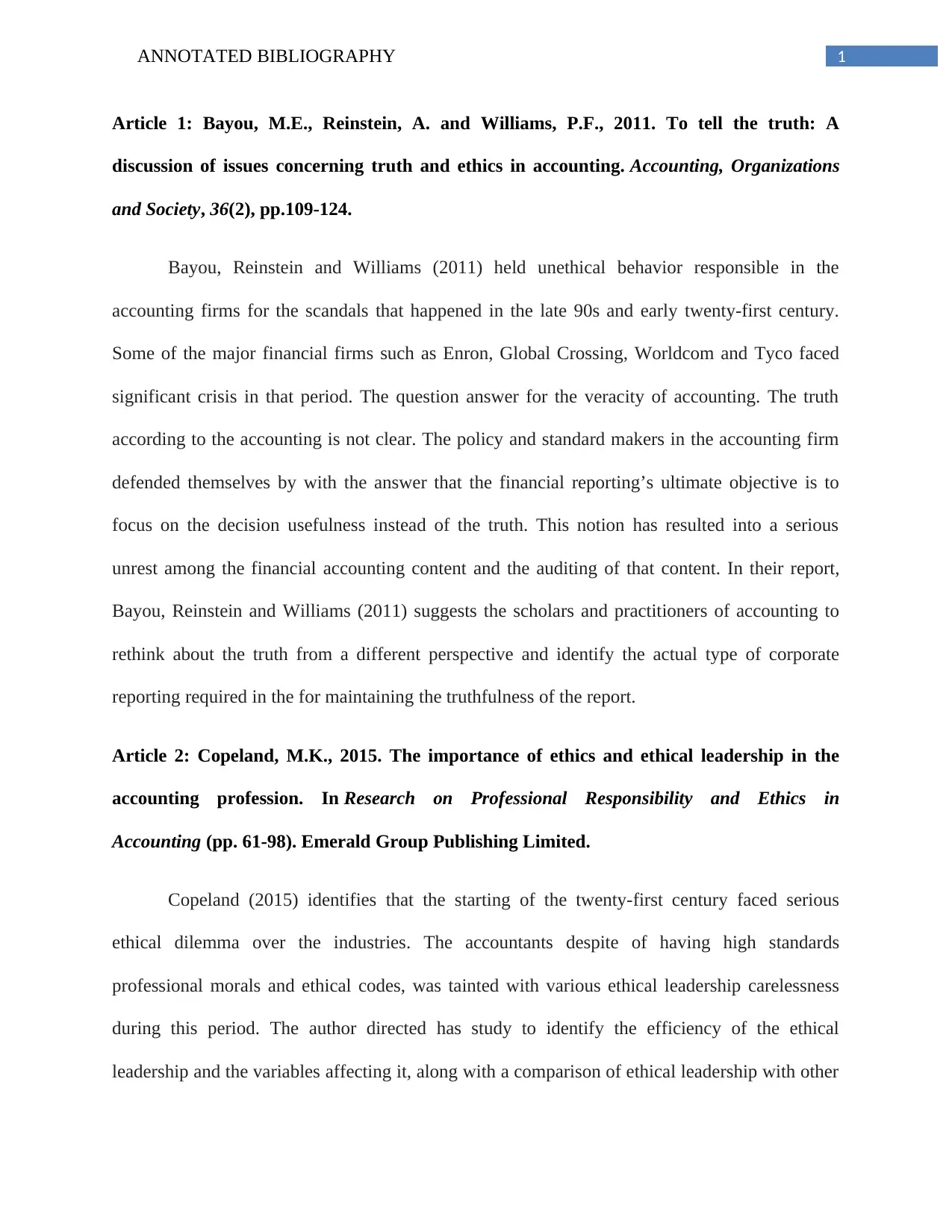
1ANNOTATED BIBLIOGRAPHY
Article 1: Bayou, M.E., Reinstein, A. and Williams, P.F., 2011. To tell the truth: A
discussion of issues concerning truth and ethics in accounting. Accounting, Organizations
and Society, 36(2), pp.109-124.
Bayou, Reinstein and Williams (2011) held unethical behavior responsible in the
accounting firms for the scandals that happened in the late 90s and early twenty-first century.
Some of the major financial firms such as Enron, Global Crossing, Worldcom and Tyco faced
significant crisis in that period. The question answer for the veracity of accounting. The truth
according to the accounting is not clear. The policy and standard makers in the accounting firm
defended themselves by with the answer that the financial reporting’s ultimate objective is to
focus on the decision usefulness instead of the truth. This notion has resulted into a serious
unrest among the financial accounting content and the auditing of that content. In their report,
Bayou, Reinstein and Williams (2011) suggests the scholars and practitioners of accounting to
rethink about the truth from a different perspective and identify the actual type of corporate
reporting required in the for maintaining the truthfulness of the report.
Article 2: Copeland, M.K., 2015. The importance of ethics and ethical leadership in the
accounting profession. In Research on Professional Responsibility and Ethics in
Accounting (pp. 61-98). Emerald Group Publishing Limited.
Copeland (2015) identifies that the starting of the twenty-first century faced serious
ethical dilemma over the industries. The accountants despite of having high standards
professional morals and ethical codes, was tainted with various ethical leadership carelessness
during this period. The author directed has study to identify the efficiency of the ethical
leadership and the variables affecting it, along with a comparison of ethical leadership with other
Article 1: Bayou, M.E., Reinstein, A. and Williams, P.F., 2011. To tell the truth: A
discussion of issues concerning truth and ethics in accounting. Accounting, Organizations
and Society, 36(2), pp.109-124.
Bayou, Reinstein and Williams (2011) held unethical behavior responsible in the
accounting firms for the scandals that happened in the late 90s and early twenty-first century.
Some of the major financial firms such as Enron, Global Crossing, Worldcom and Tyco faced
significant crisis in that period. The question answer for the veracity of accounting. The truth
according to the accounting is not clear. The policy and standard makers in the accounting firm
defended themselves by with the answer that the financial reporting’s ultimate objective is to
focus on the decision usefulness instead of the truth. This notion has resulted into a serious
unrest among the financial accounting content and the auditing of that content. In their report,
Bayou, Reinstein and Williams (2011) suggests the scholars and practitioners of accounting to
rethink about the truth from a different perspective and identify the actual type of corporate
reporting required in the for maintaining the truthfulness of the report.
Article 2: Copeland, M.K., 2015. The importance of ethics and ethical leadership in the
accounting profession. In Research on Professional Responsibility and Ethics in
Accounting (pp. 61-98). Emerald Group Publishing Limited.
Copeland (2015) identifies that the starting of the twenty-first century faced serious
ethical dilemma over the industries. The accountants despite of having high standards
professional morals and ethical codes, was tainted with various ethical leadership carelessness
during this period. The author directed has study to identify the efficiency of the ethical
leadership and the variables affecting it, along with a comparison of ethical leadership with other
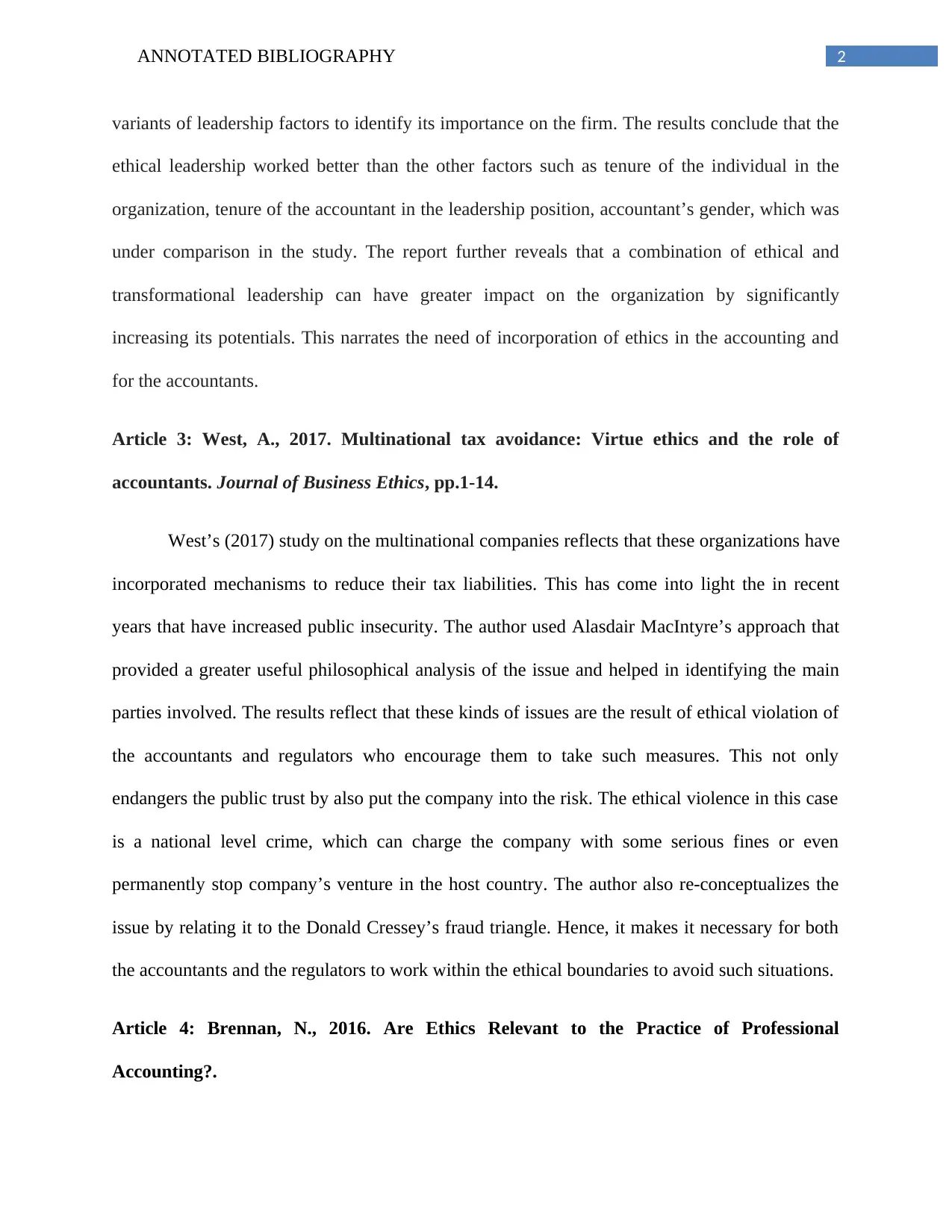
2ANNOTATED BIBLIOGRAPHY
variants of leadership factors to identify its importance on the firm. The results conclude that the
ethical leadership worked better than the other factors such as tenure of the individual in the
organization, tenure of the accountant in the leadership position, accountant’s gender, which was
under comparison in the study. The report further reveals that a combination of ethical and
transformational leadership can have greater impact on the organization by significantly
increasing its potentials. This narrates the need of incorporation of ethics in the accounting and
for the accountants.
Article 3: West, A., 2017. Multinational tax avoidance: Virtue ethics and the role of
accountants. Journal of Business Ethics, pp.1-14.
West’s (2017) study on the multinational companies reflects that these organizations have
incorporated mechanisms to reduce their tax liabilities. This has come into light the in recent
years that have increased public insecurity. The author used Alasdair MacIntyre’s approach that
provided a greater useful philosophical analysis of the issue and helped in identifying the main
parties involved. The results reflect that these kinds of issues are the result of ethical violation of
the accountants and regulators who encourage them to take such measures. This not only
endangers the public trust by also put the company into the risk. The ethical violence in this case
is a national level crime, which can charge the company with some serious fines or even
permanently stop company’s venture in the host country. The author also re-conceptualizes the
issue by relating it to the Donald Cressey’s fraud triangle. Hence, it makes it necessary for both
the accountants and the regulators to work within the ethical boundaries to avoid such situations.
Article 4: Brennan, N., 2016. Are Ethics Relevant to the Practice of Professional
Accounting?.
variants of leadership factors to identify its importance on the firm. The results conclude that the
ethical leadership worked better than the other factors such as tenure of the individual in the
organization, tenure of the accountant in the leadership position, accountant’s gender, which was
under comparison in the study. The report further reveals that a combination of ethical and
transformational leadership can have greater impact on the organization by significantly
increasing its potentials. This narrates the need of incorporation of ethics in the accounting and
for the accountants.
Article 3: West, A., 2017. Multinational tax avoidance: Virtue ethics and the role of
accountants. Journal of Business Ethics, pp.1-14.
West’s (2017) study on the multinational companies reflects that these organizations have
incorporated mechanisms to reduce their tax liabilities. This has come into light the in recent
years that have increased public insecurity. The author used Alasdair MacIntyre’s approach that
provided a greater useful philosophical analysis of the issue and helped in identifying the main
parties involved. The results reflect that these kinds of issues are the result of ethical violation of
the accountants and regulators who encourage them to take such measures. This not only
endangers the public trust by also put the company into the risk. The ethical violence in this case
is a national level crime, which can charge the company with some serious fines or even
permanently stop company’s venture in the host country. The author also re-conceptualizes the
issue by relating it to the Donald Cressey’s fraud triangle. Hence, it makes it necessary for both
the accountants and the regulators to work within the ethical boundaries to avoid such situations.
Article 4: Brennan, N., 2016. Are Ethics Relevant to the Practice of Professional
Accounting?.
⊘ This is a preview!⊘
Do you want full access?
Subscribe today to unlock all pages.

Trusted by 1+ million students worldwide
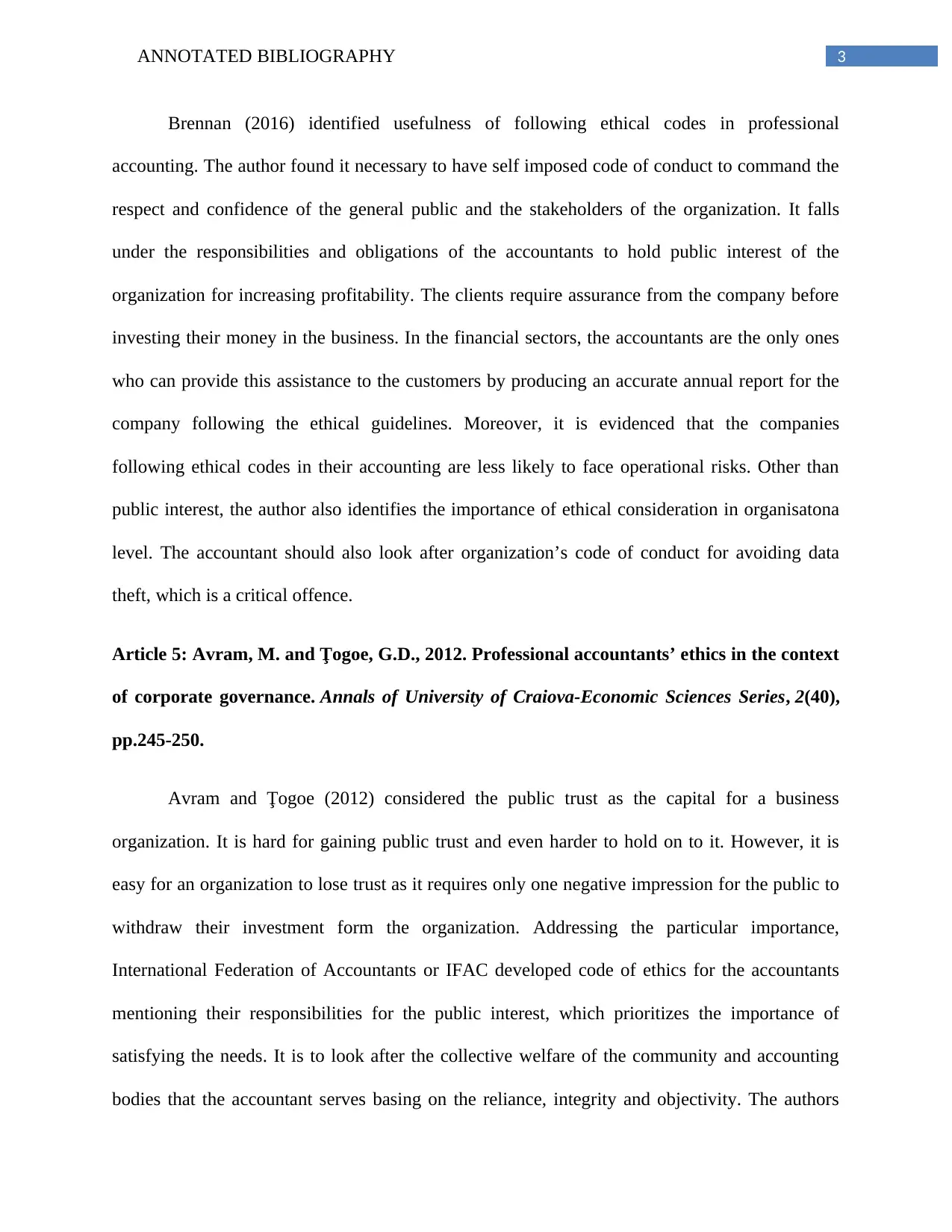
3ANNOTATED BIBLIOGRAPHY
Brennan (2016) identified usefulness of following ethical codes in professional
accounting. The author found it necessary to have self imposed code of conduct to command the
respect and confidence of the general public and the stakeholders of the organization. It falls
under the responsibilities and obligations of the accountants to hold public interest of the
organization for increasing profitability. The clients require assurance from the company before
investing their money in the business. In the financial sectors, the accountants are the only ones
who can provide this assistance to the customers by producing an accurate annual report for the
company following the ethical guidelines. Moreover, it is evidenced that the companies
following ethical codes in their accounting are less likely to face operational risks. Other than
public interest, the author also identifies the importance of ethical consideration in organisatona
level. The accountant should also look after organization’s code of conduct for avoiding data
theft, which is a critical offence.
Article 5: Avram, M. and Ţogoe, G.D., 2012. Professional accountants’ ethics in the context
of corporate governance. Annals of University of Craiova-Economic Sciences Series, 2(40),
pp.245-250.
Avram and Ţogoe (2012) considered the public trust as the capital for a business
organization. It is hard for gaining public trust and even harder to hold on to it. However, it is
easy for an organization to lose trust as it requires only one negative impression for the public to
withdraw their investment form the organization. Addressing the particular importance,
International Federation of Accountants or IFAC developed code of ethics for the accountants
mentioning their responsibilities for the public interest, which prioritizes the importance of
satisfying the needs. It is to look after the collective welfare of the community and accounting
bodies that the accountant serves basing on the reliance, integrity and objectivity. The authors
Brennan (2016) identified usefulness of following ethical codes in professional
accounting. The author found it necessary to have self imposed code of conduct to command the
respect and confidence of the general public and the stakeholders of the organization. It falls
under the responsibilities and obligations of the accountants to hold public interest of the
organization for increasing profitability. The clients require assurance from the company before
investing their money in the business. In the financial sectors, the accountants are the only ones
who can provide this assistance to the customers by producing an accurate annual report for the
company following the ethical guidelines. Moreover, it is evidenced that the companies
following ethical codes in their accounting are less likely to face operational risks. Other than
public interest, the author also identifies the importance of ethical consideration in organisatona
level. The accountant should also look after organization’s code of conduct for avoiding data
theft, which is a critical offence.
Article 5: Avram, M. and Ţogoe, G.D., 2012. Professional accountants’ ethics in the context
of corporate governance. Annals of University of Craiova-Economic Sciences Series, 2(40),
pp.245-250.
Avram and Ţogoe (2012) considered the public trust as the capital for a business
organization. It is hard for gaining public trust and even harder to hold on to it. However, it is
easy for an organization to lose trust as it requires only one negative impression for the public to
withdraw their investment form the organization. Addressing the particular importance,
International Federation of Accountants or IFAC developed code of ethics for the accountants
mentioning their responsibilities for the public interest, which prioritizes the importance of
satisfying the needs. It is to look after the collective welfare of the community and accounting
bodies that the accountant serves basing on the reliance, integrity and objectivity. The authors
Paraphrase This Document
Need a fresh take? Get an instant paraphrase of this document with our AI Paraphraser

4ANNOTATED BIBLIOGRAPHY
further gave ethics importance by stating its goals. As stated by the authors, the ethical guideline
helps the in achieving goals of business.
further gave ethics importance by stating its goals. As stated by the authors, the ethical guideline
helps the in achieving goals of business.
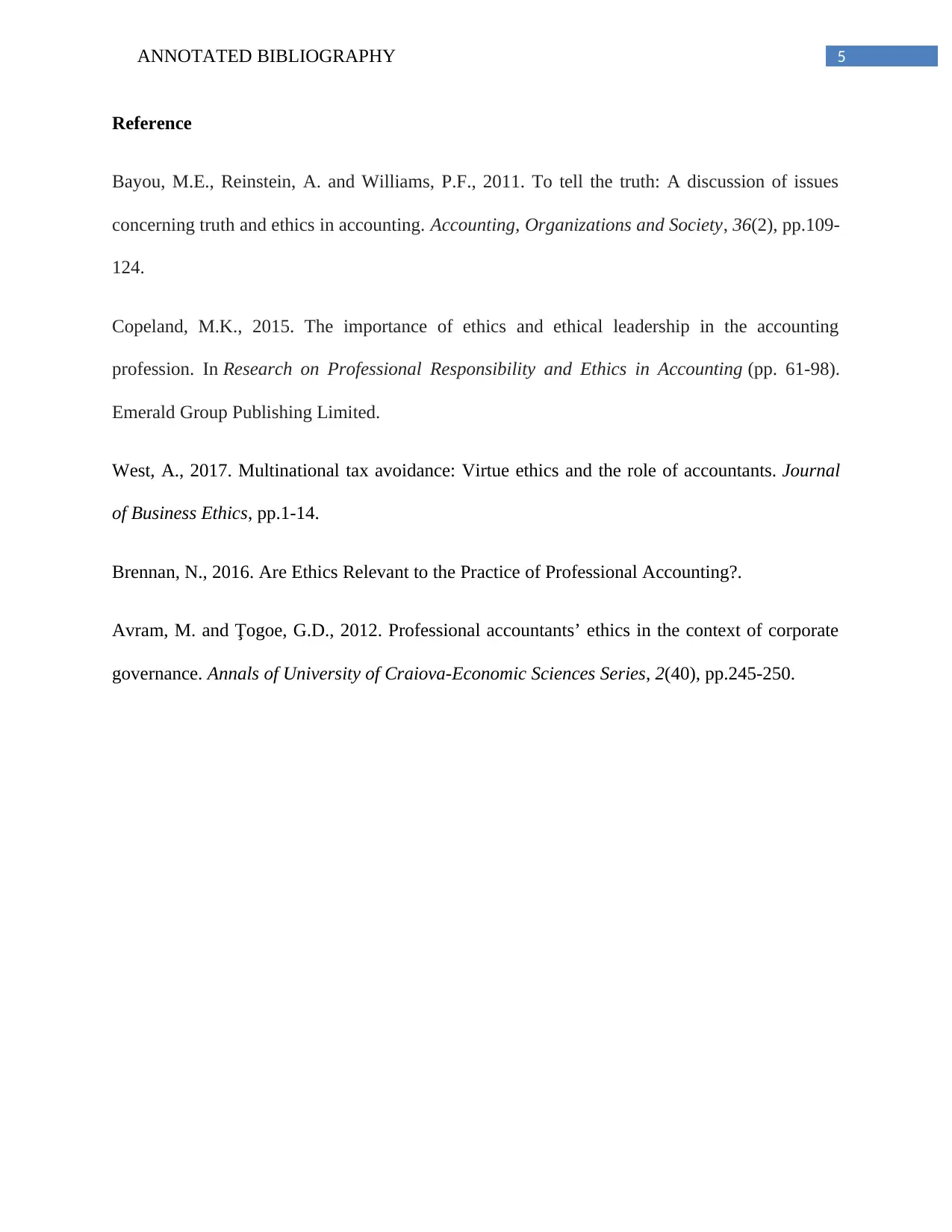
5ANNOTATED BIBLIOGRAPHY
Reference
Bayou, M.E., Reinstein, A. and Williams, P.F., 2011. To tell the truth: A discussion of issues
concerning truth and ethics in accounting. Accounting, Organizations and Society, 36(2), pp.109-
124.
Copeland, M.K., 2015. The importance of ethics and ethical leadership in the accounting
profession. In Research on Professional Responsibility and Ethics in Accounting (pp. 61-98).
Emerald Group Publishing Limited.
West, A., 2017. Multinational tax avoidance: Virtue ethics and the role of accountants. Journal
of Business Ethics, pp.1-14.
Brennan, N., 2016. Are Ethics Relevant to the Practice of Professional Accounting?.
Avram, M. and Ţogoe, G.D., 2012. Professional accountants’ ethics in the context of corporate
governance. Annals of University of Craiova-Economic Sciences Series, 2(40), pp.245-250.
Reference
Bayou, M.E., Reinstein, A. and Williams, P.F., 2011. To tell the truth: A discussion of issues
concerning truth and ethics in accounting. Accounting, Organizations and Society, 36(2), pp.109-
124.
Copeland, M.K., 2015. The importance of ethics and ethical leadership in the accounting
profession. In Research on Professional Responsibility and Ethics in Accounting (pp. 61-98).
Emerald Group Publishing Limited.
West, A., 2017. Multinational tax avoidance: Virtue ethics and the role of accountants. Journal
of Business Ethics, pp.1-14.
Brennan, N., 2016. Are Ethics Relevant to the Practice of Professional Accounting?.
Avram, M. and Ţogoe, G.D., 2012. Professional accountants’ ethics in the context of corporate
governance. Annals of University of Craiova-Economic Sciences Series, 2(40), pp.245-250.
⊘ This is a preview!⊘
Do you want full access?
Subscribe today to unlock all pages.

Trusted by 1+ million students worldwide
1 out of 6
Your All-in-One AI-Powered Toolkit for Academic Success.
+13062052269
info@desklib.com
Available 24*7 on WhatsApp / Email
![[object Object]](/_next/static/media/star-bottom.7253800d.svg)
Unlock your academic potential
Copyright © 2020–2026 A2Z Services. All Rights Reserved. Developed and managed by ZUCOL.